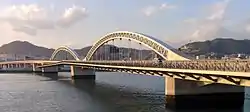Ōta River
Ōta River (太田川, Ōta-gawa) is a 103 kilometer (64 mile) long river in Hiroshima Prefecture, Japan. Its main stream originates in Mt. Kanmuri (冠山, Kanmuri-yama) (1,339m) and empties through a flood control channel into the Seto Inland Sea. The river is one of the major rivers in the prefecture and descends through steep topography, with hydroelectric power plants situated along the river.
| Ota River | |
|---|---|
 Ōta River Bridge, the southernmost of all the crossings of the Ōta River | |
| Physical characteristics | |
| Source | Mt. Kanmuri[1] |
| • location | Hatsukaichi, Hiroshima |
| Mouth | Hiroshima Bay, Seto Inland Sea[1] |
• location | Hiroshima |
• coordinates | 34°21′39″N 132°24′20″E |
| Length | 103 km (64 mi)[1] |
| Basin size | 1,710 km2 (660 sq mi)[1] |
Ōta River has numerous tributaries and branches into the delta area of Hiroshima which comprises Tenma, Kyūōta/Honkawa, Motoyasu, Kyōbashi, and Enkō rivers.
Originally, the Ōta River passes through the western side of Aioi Bridge which was the aiming point for the atomic bombing of Hiroshima. A flood control channel[2][3] was built along the former Yamate river in the late 1960s, which became the main passageway of the Ōta River. The original passageway of the Ōta River is now known as the Kyūōta River (旧太田川, Kyūōta-gawa, lit. "Old Ōta") or Honkawa River (本川, Honkawa).
Ōta River runs through the municipalities of Hatsukaichi, Akiota, Kitahiroshima, Akitakata, Higashihiroshima and Hiroshima. The size of its catchment area is 1,710 km².
See also
- Sandan-kyō - a ravine located in a tributary river of the Ōta River.[4]
References
- "太田川(おおたがわ)とは - コトバンク" (in Japanese). kotobank. Retrieved December 30, 2017.
- http://www.thr.mlit.go.jp/iwate/kodomo/english/river_e/MAIN/tetteiteki/hiroshima/OOTAGAWA/KANSATSU/karyu.html. Retrieved January 26, 2021. Missing or empty
|title=(help) - https://www.city.hiroshima.lg.jp/site/english/5491.html. Missing or empty
|title=(help) - "三段峡(さんだんきょう)とは - コトバンク" (in Japanese). kotobank. Retrieved December 30, 2017.
External links
- Ootagawa - Ministry of Land, Infrastructure, Transport and Tourism (in Japanese)
| Wikimedia Commons has media related to Ota River. |